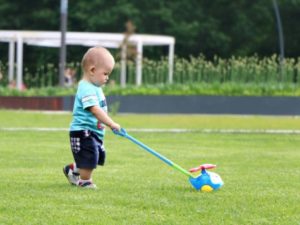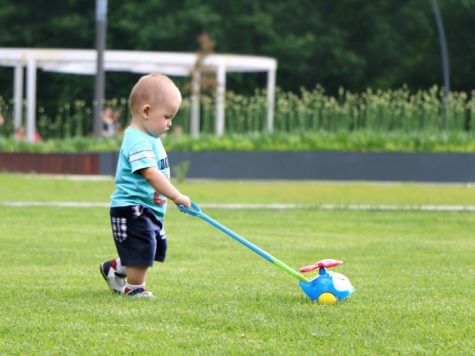CAMBRIDGE, Mass. — At only 15 months, babies are able to learn the value of hard work.
Studying how young children learn when to quit trying and when to persist, cognitive scientists at the Massachusetts Institute of Technology find that persistence or “grit” is a characteristic parents can pass on to toddlers.
The researchers say the findings are especially important in light of recent studies finding persistence is often a more accurate predictor of success than IQ.

“There’s some pressure on parents to make everything look easy and not get frustrated in front of their children,” says MIT cognitive science professor Laura Schulz in a press release. “There’s nothing you can learn from a laboratory study that directly applies to parenting, but this does at least suggest that it may not be a bad thing to show your children that you are working hard to achieve your goals.”
In their first experiment showing this, the researchers had 15-month-old babies watch adults performing two tasks: removing a toy frog from a container, and taking a key chain off a carabiner. Half of the babies in the study saw the adult quickly succeed at the tasks, and the other half watched the adult struggle for at least 30 seconds before succeeding.
After this, the babies were shown a musical toy. While the toy had a decoy button that looked like it should turn the toy on, the actual on/off switch was on the bottom. After demonstrating that the toy could be turned off and on (without giving away the actual switch location) the researchers gave the toy to the babies.
The babies that had watched adults struggle with the earlier tasks tried pressing the button almost twice as many times as the babies who saw the adults easily succeed.
“There wasn’t any difference in how long they played with the toy or in how many times they tossed it to their parent,” says researcher Julia Leonard. “The real difference was in the number of times they pressed the button before they asked for help and in total.”
In addition to this, the scientists also found that the babies tried harder when adults made eye-contact with them, talked directly to them, and said their names.
“What we found, consistent with many other studies, is that using those pedagogical cues is an amplifier. The effect doesn’t vanish, but it becomes much weaker without those cues,” Schulz says.
The findings come following a recent push by researchers, such as Angela Duckworth, who are seeking to find ways to better motivate students and test for abilities outside of intelligence.
Speaking at a TEDTalk, Duckworth — who originally worked as a management consultant — says she first started exploring these questions when she took on a job teaching New York City seventh-graders math.
“What struck me was that IQ was not the only difference between my best and my worst students. Some of my strongest performers did not have stratospheric IQ scores. Some of my smartest kids weren’t doing so well,” she says in the talk. “In education, the one thing we know how to measure best is IQ. But what if doing well in school and in life depends on much more. than your ability to learn quickly and easily?”
Spurred by this, Duckworth went on to pursue a graduate degree in psychology, studying what makes students succeed everywhere from West Point Academy to the National Spelling Bee.
Her results showed it was students with more perseverance that were the most likely to succeed — whether that meant graduating high school or winning a competition.
While Duckworth then said she doesn’t know exactly how to instill such grit in children, she noted that a “growth mindset” seems to be the most important factor.
Developed at Stanford University by Carol Dweck, “growth mindset” is a term for the belief that one’s ability can be developed and is not fixed.
“A growth mindset isn’t just about effort. Perhaps the most common misconception is simply equating the growth mindset with effort,” Dweck says in an Education Week article. “Certainly, effort is key for students’ achievement, but it’s not the only thing. Students need to try new strategies and seek input from others when they’re stuck. They need this repertoire of approaches—not just sheer effort—to learn and improve.”
Accordingly, while the latest study from MIT adds a piece to the puzzle of instilling perseverance, the researchers say its key takeaway is just how early people learn to make decisions about allocating effort.
“We’re a somewhat puritanical culture, especially here in Boston. We value effort and hard work,” says Schulz. “But really the point of the study is you don’t actually want to put in a lot of effort across the board. Effort is a limited resource. Where do you deploy it, and where do you not?”
To find further answers, the researchers say there is more work to do. They say one of the next items on the agenda is finding out how long the effects of observing effort last for the infants.
The paper detailing the results of Schulz and her colleague’s study was published in the September 21 online edition of the journal Science.

This just in: kids follow examples.